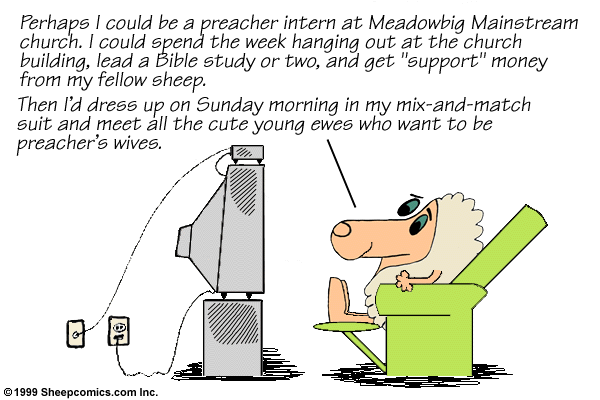





Editorial Notes
When did Christianity become a career?
When I was in business school at the university, someone who wanted to get on the "fast track" in their career could apply for an "internship" at a big corporation. The corporations only wanted the best and brightest students for interns. The students who were awarded internships got the privilege of taking the summer, or a few months off from the regular school year, and working at a "real job" at a "real company". When graduation time came, they often had a "foot in the door" at the company where they completed their internship. Or, the student may find during the internship that they really donít like a certain kind of work, and they can make a career change while still in school.
The corporations benefited too. They got several months of work from the best and brightest young minds at the university without paying very much, and they got increased visibility at the university by offering the internships in the first place. When "recruiting season" (graduation time) came, they already had some very bright students out there who knew the "company way" and had proven they could succeed if offered a career. So, this system provides a benefit for both the student and the companies who hire young people right out of college.
During much of my time in business school, I went to a large church that was run by a team of professionals. There was one professional that all the others reported to. The head professional has a very general title. The "others" had titles that gave me an idea of the role they played in the leadership structure of the church.
This church also had an "intern" program. If you were one of the brightest and most spiritual young men, you could apply to become an "intern". (It seems that recently these kinds of programs are opening up for women too.) Being a "preacher intern" meant that you spent two years doing "church stuff", and then you could apply to other churches for a job as a full-time professional minister.
Now, Iím not saying that all school or church training programs that call themselves "internships" are necessarily wrong, thereís just something a little ironic about the way this system works, or at least the way Iíve seen it work.
First, there is the assumption that when you are in your early twenties, you must choose which "class" of Christians you want to belong to. You can apply to a program that will put you on a career track to be a full-time paid professional in the church system, or you can just get a job in the "world" like everyone else.
The irony is that if you opt to get a job in the "world", you also opt to be forever lead in church by people who never have lived in the world that you live in. The church "internship" program makes it possible for a young man to go from the unreal world of college, to the unreal world of "preacher internship", to the "set apart" world of "professional Christianity".
It occurred to me that this particular church system was raising an entire generation of leaders who will have never had to live in the "real world". This is the world where people: 1) get out of bed and sit in traffic so they can get to work at a certain time, 2) do something all day (or night) they might not enjoy doing, 3) with people who donít believe the way they do (and may be really mean about it), and 4) get up the next day and do it again. The "spiritual elite", the ones who will be my spiritual leaders for all my time on earth, are the ones who are "set apart" from this banal, often vulgar, non-believing world from the "cradle to the grave".
Who provides the means for them live in this "set apart" world? I do, of course. In the system I remember, the first major hurdle an aspiring preacher intern had to jump was a financial one. Each intern-to-be had to raise enough "support" money directly from members of the church to live for two years. (While I was learning my profession working overtime in a pressure-cooker job, I got a phone call from a young man my same age asking me for money so he could spend all his time at the church building preparing for "the ministry"). Of course, after their internship they can get official "church jobs" with salaries and live off, you guessed it, members of the church.
Itís not that I think itís wrong to financially support ministers. We know that Jesus worked as a carpenter until he began his ministry (Mark 6:3) , and during the time of his ministry he was supported by others, including women (Matthew 27:55). We know that the Apostle Paul was a tentmaker (Acts 18:3). It seems that at times he supported himself, and at other times his ministry was at times supported by others (2 Corinthians 11:9).
What I take exception to is a system where a young man purposely avoids acquiring any skills that are marketable in the secular world, joins a "church professional" training program, and then becomes a "professional Christian" without ever having to confront the faith-busting realities that all us non-professional Christians have to deal with in our day-to-day lives of working in the secular world. I have to pay to shelter the "elite" from the secular world, and then they are held up as my spiritual superiors whose job it is to tell me how to live in the secular world. What a strange system.
Just a thought, from Just One Sheep.